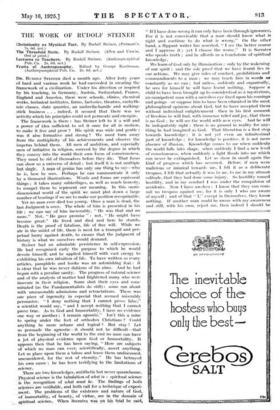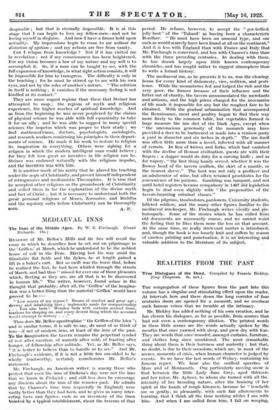THE WORK OF RUDOLF STEINER
Dar. RUDOLF STEINER died a month ago. After forty years of hard and various work he had succeeded in creating the framework of a civilization. Under his direction or inspired
by his teaching, in Germany, Austria, Switzerland, France, England and America, there were schools, clinics, chemical works, technical institutes, farms, factories, theatres, eurhyth- mic classes, slate quarries, an umbrella-handle and walking- stick business . . . indeed, it seemed that there was no activity which his principles could not permeate and energize.
The framework is there : has Steiner left to it a will and a- power of idea sufficient to set it once for all in motion,
to- make it live and grow ? His spirit was wide and gentle : was it also formative and strong ? We must turn away from the multiplicity of his achievements and observe the impetus behind them. All men of ambition, and especially men of initiative in religion, succeed by the degree in which they convey into the world their own focus of consciousness.
They must be rid of themselves before they die. That focus can show us a universe of detail ; but itself it is not multiple
but single. A man of genius has only one thing to say—who he is, how he sees. Perhaps he can communicate it only by a thousand illustrations. Words and forms are equivocal
things ; it takes many subterfuges, as well as much honesty, to compel them to represent our meaning. In this omni- dimensional world of the spirit 'we must plot down a large number of bearings if we are to make our position recognizable.
• Yet no man ever died too young. Once a man is dead, the last Judgment is over. The whole of him is presented in his life ; we can.. say of him inexorably, " He was that and no more." Not;:" He gave promise " : not, " He might have become great .r He lived and died and here lie stands.
Death is the proof of fatalism, life of free will. While we are in the midst of life, there is need for a tranquil and per- petual hurry against death, to ensure that the judgment of history is what we ourselves would demand.
Steiner had an admirable persistence in self-expression.
He had recognized early the purpose to which he would devote himself, and lie applied himself with vast energy to exhibiting his own intuition of life. To have written so ]many articles, pamphlets and books was an astonishing feat : it is clear that he was never dubious of his aims. And he had begun with a peculiar sanity. The progress of natural science and of the analysis of matter had frightened many who were insecure in their religion. Some shut their eyes and corn- minated (as the Fundamentalists do still) : some ran about with unseasonable admissions and retractations. There was one' piece of ingenuity in especial that seemed miserably persuasive. " I deny nothing that I cannot prove false," a scientist would say, " and I accept nothing that I cannot prove true. As to God and Immortality, I have no evidence
one way or another.: I remain agnostic." Isn't this a mine
to spring under the feet of orthodox Christians ? Could anything be more urbane and logical ? But stay ! Let us persuade the agnostic—it should not be difficult—that from the beginning of the world to the end no man can have a . jot of physical evidence upon God or Immortality. It appears then that he has been saying, " Here are subjects of which no man can ever, scientifically, assert anything.
Let us place upon- them a taboo and leave them undiscussed, unconsidered, for the rest of eternity." He has betrayed his own cause : he has been testifying to the limitations of
.science. There are two Irrowledges, antithetic but never quarrelsome.
physicaL,science is the tabulation of what is : spiritual science the recognition of what must be. The _findings of both sciences are verifiable, and both call for a technique of experi- inent.. The problems of the existence and nature of God, of immortality, of beauty, of virtue,, are in the domain of spiritual science. When Socrates was on his trial:he, said, " If I have done wrong it can only have been through ignorance: For it is not conceivable that a man should know what is right and continue to do what is wrong." On the other hand, a flippant writer has asserted, " I see the better course and I approve it ; yet I choose the worse." It is Socrates who speaks truth ; and he affords us a touchstone of spiritual knowledge.
We learn of God only by illumination ; only by the wakening of our spirit ; and the sole proof that we have learnt lies in our actions. We may give rules of conduct, prohibitions and commandments to a man ; we may teach him in words as constantly as we can ; but unless, suddenly and organically, lie sees for himself he will have learnt nothing. Suppose a child to have been brought up to consider God as iniysterions; an omnipotent man with a merciless eye fixed upon his comings and goings—or suppose him to have been educated in the most philosophical opinions about God, but to have accepted therri without individual enlightenment - then in his first moment of freedom he will find, with immense relief and joy, that there is no God ; he will see the world with new eyes. And he will be indisputably right ; there is no ground in reality for any- thing he had imagined as God. That liberatiOn is a first step towards knowledge ; it is not yet even an infinitesimal part of knowledge ; for knowledge is positive, it is not mere absence of illusion.. Knowledge comes to Inc when suddenly the world falls into shape, when suddenly I find a new level of consciousness, when suddenly a light floods into me which can never be extinguished. Let us show in small again the kind of progress which has occurred. Before; if awn were malicious or inimical towards me, I felt it as a deliberate trespass, I felt that actually it was to we, to main my utmost solitude, that they had done some injury. So hostility roused hostility, and in my conduct I was under the eompuision of accidents. Now I have awoken : I know that they can dom.- mit no trespass against me, for it is only I who am aware of myself ; and of that " I," except in themselves, they know nothing. If another man could be aware with my awareness and still, with his own, reject me, then indeed I should be
despicable ; but that is eternally impossible. It is at this stage that I can begin to love my fellow-men—and not be loving myself in disguise. And now I have a firmer hold upon actuality. My impressions begin to come to me without the distortion of egotism ; and my actions are free frinn vanity.
Can I relapse from knowledge ? Not if it has visited me in revelation ; not if my consciousness has been heightened. For my vision becomes a law of my nature and my will is to accomplish it. So, if a man can be taught to see, with the full expansion of knowledge, in what right action consists, it will be impossible for him to transgress. The difficulty is only in the teaching ; for he must be stirred up to see with his own eyes, and not by the rules of another's nature. " The solution in itself is nothing ; it vanishes if the necessary feeling is not kindled at its contact."
They are more august regions than these that Steiner has attempted to map ; the regions of myth and religious experience, the higher reaches of spiritual knowledge. And as from the beginning he was never perplexed by the claims of physical science he was able with full equanimity to take it for an ally ; and he was able to suggest in many special sciences the impetus which was proper to their study ; we find mathematicians, doctors, psychologists, sociologists, and research workers confirming his principles in their depart- ments of science. He made it his work to restore to religion its inspiration in everything. Others were sighing for a religion in which the modern intelligent man could believe ; for they felt how great an incentive in life religion can be. Steiner was endowed naturally with the religious impulse, and the incentive was with him.
It is another mark of his sanity that he placed his teaching under the aegis of Christianity, and proved himself independent of retrogressive and mediumistic Theosophies. It is true that he accepted other religions as the groundwork of Christianity and called them in for the explanation of the divine myth and fact of Christ ; but it is necessary to understand both the great personal religions of Moses, Zoroaster, and Buddha and the mystery cults before Christianity can be thoroughly











































 Previous page
Previous page